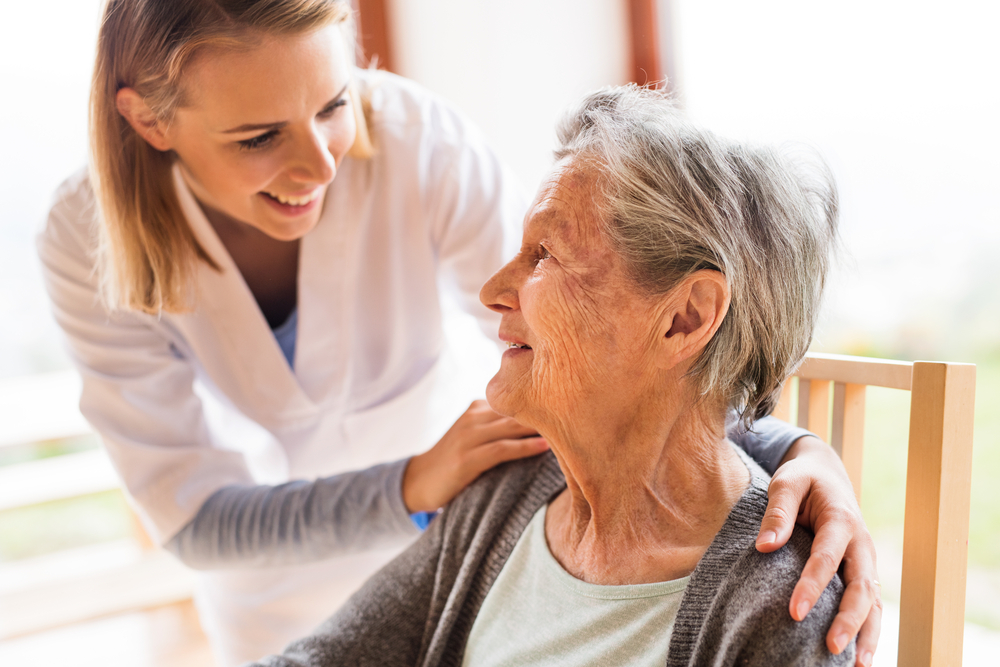You often joke with Mom about her forgetting her keys frequently or never being able to find her glasses. But when she’s skipped a medication dosage or left her walker in the restaurant, these signs warrant further attention.
The Importance of Identifying the Signs
Many things change with us as we age. But when is a change significant enough to delve a little deeper and seek extra help?
Your awareness and noticing these changes can make a significant impact on your parent’s safety and well-being.
Your intuition is crucial here. That ‘something isn’t right’ feeling is giving you a message.
Signs Your Aging Parent Needs Assistance
Below are 12 signs indicating that your parents might need additional support like home health aides.
Weight Loss or Gain
Is your health-conscious mother frequently eating take-out? Is your dad looking gaunt?
Unhealthy eating habits could be a sign of dementia, medication side effects, or poor mobility.
Change in Appearance
Do you notice unmentioned bruising, unkempt hair, or a change in their usual grooming routine?
It’s important to notice any signs of behavioral health issues like abuse, depression, or dementia.
Lack of Hygiene
Take note of any bad odors, spoiled clothing, unbrushed teeth, or other signs your parent has lost interest in personal hygiene.
They could be suffering with mobility issues, Alzheimer’s, or depression.
Unkept Home
Do the piles of laundry seem to be growing? Is there food rotting in the fridge? Your elderly parents may be struggling due to physical limitations, cognitive decline, or depression that can be helped with the support of home health aides
Car Damage
Do you notice unexplained dents or scratches on your parent’s car?
Deteriorating eyesight dementia, Alzheimer’s, and other factors can pose a serious danger to their safety and the safety of other drivers.
Missed Medication
Are pill boxes still full? Or still empty?
Cognitive decline or lack of motivation can mean your parents may be neglecting their health, with no one accountable for them.
Skilled nursing care at home can help your loved one.
Unpaid Bills
Is the outstanding electric bill, expired car registration, or bounced check due to financial strain or some other underlying reason?
Repeated Falling
Does your parent fall or stumble frequently?
Their balance, muscle strength or vision could be a contributing factor here.
Misplaced Items
Constantly misplacing items can be a sign of cognitive decline requiring long-term health management at home.
We all lose things, but when it becomes difficult to go about daily activities, this is your red flag that something is up.
Lost Interest in Hobbies
Has your elderly parent stopped doing the things they’ve always loved to do? Have they stopped socializing as much?
As they age, your parents may be feeling depressed about their physical limitations. Perhaps their mobility is waning, or they’re experiencing cognitive difficulties.
Trouble Eating or Swallowing
Swallowing difficulties can be a sign of neurological disorders and may result in your elderly parents drinking less or stopping taking their medications.
Mood Changes
Is your parent having outbursts or behaving in a way that is against their usual nature?
This could be a sign of behavioral health issues related to depression, anxiety, or other underlying medical or cognitive issues.
If you notice your parent is experiencing any of the above signs, it’s time to step in and discuss the skilled nursing care option available to them.
Senior Care Options for Aging Parents
CDPAP Program
CDPAP (Consumer Directed Personal Assistance Program) is a Medicaid-funded program for seniors to choose their personal caregivers and receive these services at home. This program gifts participants with greater independence and the freedom to direct their own care.

CDPAP is an ideal program for aging parents who are home-eligible, require assistance with ADLs (activities of daily living), and want to receive care from someone they already know and trust in familiar surroundings.
Who is eligible for CDPAP?
To qualify for the CDPAP program, your parent must have Medicaid insurance and meet the Medicaid criteria for the program. A CDPAP home care agency will guide you through the process, as well as assist you with enrollment and discovering your eligibility.
The program is covered completely by Medicaid without any out-of-pocket expenses.
Nursing Home Care
If your aging parent requires a higher level of care due to physical or cognitive limitations, a nursing home is a great option. Facility-based care means your parent receives skilled nursing care around the clock and has access to therapies, wound care, daily activity assistance, medication management, and more. Though not in their own home, senior care in a nursing home means your parent can benefit from a social setting with a community feel.
Nursing home care gives you the assurance that your parent is getting everything they need from trained, professional staff.
Who is eligible for nursing home care?
If you’re considering nursing home care for your aging parent, check that they meet the state’s criteria for a nursing home level of care. The cost for a nursing home is usually a set fee, covering board, meals, and care services.
NHTD Program
The NHTD Waiver Program (Nursing Home Transition and Diversion) is a home and community-based program that gives seniors who require a nursing home level of care the chance to receive services in their own homes.
The program allows seniors to direct their own care, giving them independence and control over their care decisions, while still being accountable for their safety and well-being.
Who is eligible for the NHTD Program?
Seniors enrolling in the NHTD program need to meet the following criteria:
- Require a nursing home level of care
- Enrolled with Medicaid
- Aged 18-64 and are registered as having a physical disability OR aged 65+
- Sign the Freedom of Choice form
- Have an identified living arrangement
Read the full guide to the NHTD program here.
Americare Can Help
Every day at Americare we help seniors and their families in the New York area navigate their personal journeys to better health and better care. Our wide range of services including care for chronic conditions allows individuals to find their preferred path to receiving care.
Reach out to us at Americare today and speak to a healthcare professional to determine the best choice for your aging parent.
Remember, if you are a caregiver for your parent, be sure to care for yourself and get the help you need.

